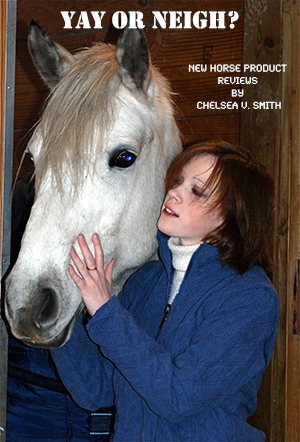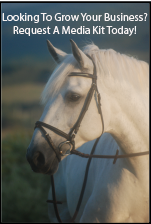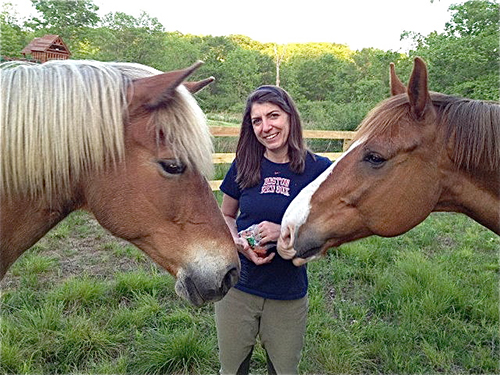The Evolution of a Horsewoman
When I was four years-old, my father took me for a walk on a summer's evening. It was just after dinner and the sun was still in the sky. I remember walking down the hill of our street, holding his hand, my white Stride Rite sandals slapping against the sidewalk. About halfway around the block, he pointed down a cul de sac and said, "Tonight, let's go that way."
Even with my little legs, it didn't take us long to reach the end. I was surprised when he continued walking across someone's driveway and over to a split-rail fence. And then I saw him. He was big and white and beautiful. He hung his head over the top rail and my father fed him a carrot that magically appeared from his pocket. To be honest, I don't remember his name. I know he was a retired thoroughbred that belonged to our neighbor. I do know that I touched his nose and marveled at its softness, at his warm breath on my hand, and the whiskers that itched my palm. This was the beginning of my evolution.
Of course, my mother would tell a different story about my first equine encounter. She loves to tell the tale about a 2 year-old girl who screamed and cried when her parents tried to get her on a pony at the zoo. I insist to this day that it's because I wanted to be on a horse by myself, not some little pony being led around in a circle. I simply cannot imagine a time when I didn't want to be on a horse.
At the age of eight, my mother reluctantly decided that I could take riding lessons. I can still remember her telling me that I would start lessons, but that it was just so I "could learn how to ride on the trail." She didn't want me jumping, and she certainly didn't want to get involved in showing. My first lesson was on a medium dark bay pony named Molly, at a backyard barn that bordered Fairmount Park in Philadelphia. In the few years that I rode there, I basically learned how to start, stop, and stay on. Looking back, I'm sorry that my parents weren't better informed about horses and riding since I'm not entirely certain that this barn would be allowed to operate if it were still around today. That being said, I don't fault my parents. My lessons were $10 an hour for a semi-private lesson, and I was so excited to go each week that my stomach would start doing flip-flops the night before. I remember the feeling of true disappointment once the cold weather set in and lessons were cancelled for the winter, and anxiously awaited the call each spring to say that lessons were starting once again.
Finally, one spring, the call never came. The owner of the barn simply decided to close up shop and move. I think for my parents, it was a relief. After all, I knew the basics as far as they were concerned, but for me, it simply meant I had to find another way to ride. At some point, I saw in our local newspaper that a barn formerly used by the Philadelphia mounted police was opening up for lessons. Without asking my parents, I called the number and left messages asking if I could be a working student. I called every day until someone finally called me back and told me I could start. From the next 5 years, I worked in exchange lessons, and I would do just about anything for a chance to ride. And I would ride anything -- from the off-the-track filly who was known for being nuts, to the quarterhorse who was great fun on the trails, but whose owner would spend hours telling me more than my teenage self ever needed to know about her dating life.
Throughout my high school years, I tried out several different barns. I was always trying to find a way to learn more, to ride more, to be as close to horses as I could. Unfortunately, I didn't have the financial means or know-how to pick out a good trainer or know what it was like to ride a well-trained horse. The bulk of what I learned however, still went back to my base of just knowing how to stay on. Once I got to college, that all changed. I attended a small liberal arts college in upstate New York and the area was full of horse farms. After spending my first two years trying out various barns, I finally found my niche with a show barn about 40 minutes from school. The riders at this barn went to all the big "A" hunter/jumper shows and rode horses that cost more than my parents' house. I was lucky enough to be taken on as a working student, and my whole world changed. I finally had an opportunity to ride horses that helped me become a better rider, and work with a trainer who could fully explain the riding fundamentals that I'd never learned early on. I finally learned to ride. In a short period of time, I found myself winning ribbons at Old Salem, HITS, and Vermont. I learned how to wrap legs and give IV shots, body clip and braid. Eventually, I was showing so much that I was no longer nervous when I entered the show ring. It was a whole new world.
One lesson drilled into my head was that horses are too expensive to be seen as pets. My trainer stressed the importance of seeing horses as animals with a job to do. Not that we shouldn't take care of them or respect them, but we shouldn't bond with them.
Those warnings turned into "I told you so's" when my favorite horse, a bay Hanoverian gelding was abruptly sold due to the owner's divorce. He was my first true love of the equine variety. He would whinny when I came into the barn, and would do anything I asked of him. He was honest and kind and I spent every spare moment I had with him. I can still see his new trainer leading him onto the gooseneck trailer, legs wrapped in blue and a new fuzzy halter on his handsome face. His ears were pricked forward, but he didn't look worried. After all, nothing worried him. He simply looked interested. To this day, I still wish I had kissed his nose one more time before he left for his new life in Connecticut.
After that day, I heeded my trainer's warning. I would ride and care for all the horses in the barn, but I made no attempts to try and connect with any of them. I worked there for about another 6 months before I decided it was time to move on. Being on the road so much was getting tiring, as were the long hours. I saw a job opening as a vet tech for a local equine practice and jumped at the opportunity. In the back of my mind, I had always contemplated trying to get into vet school, and I thought this could be a big stepping stone in the decision-making process.
Becoming a vet tech was a life-changing event for me, but not at all in the way I anticipated. The hours were even more grueling than when I was on the show circuit, and the work was tedious much of the time. That being said, there were some important lessons learned: Not all horses are kind. Mean-tempered horses still require veterinary attention, and equine vets need incredibly fast reflexes to avoid flying hooves and snapping teeth. I lasted one year as a vet tech before I decided it wasn't for me. Don't get me wrong, it wasn't all bad. I met some fun, fascinating and sometimes crazy horse people along the way. It is also due to that job that I finally saw my dream of horse ownership come true.
The vet and I would occasionally travel to a small barn about an hour from the office to do work for a couple who had dressage horses. I loved going there. The horses were kind and well-mannered, and the owners treated me with respect. I would always bring a bag of carrots for their horses because I enjoyed them so much. Shortly after I left that job and moved to CT (where I had resigned myself to finally getting a job in corporate America), that couple called me. They asked me if I would like to buy their 6 year-old Hanoverian at a more than affordable price. They wanted to give me an opportunity that I would never have otherwise, and they remembered the vet telling them that he was the only horse I ever brought carrots for. And that was how my dream finally came true.
That was 15 years ago. In the years that followed, I have since gotten married, had children, and sold that horse to a very dear friend for the same reason that couple sold him to me. I lost touch with those people for a time, but now we are back in each other's lives. In fact, I now own two more of their horses. Recently, in thinking about my evolution as a horsewoman, I have come to realize that ultimately, it is because of them that I have become the person I am today. I have learned more life lessons from them in the last few years, than I did during the rest of my "horsey" career: Kindness goes a very long way, not only with horses, but with people as well. Peace of mind is more important than financial gain. Most importantly, it is more than okay to love a horse. We are supposed to love them, and it is okay to cry when you say good-bye.
I am no longer a part of the A-circuit show world. My horses live in my backyard. But I have the satisfaction of being able to walk out my back door each day to kiss their noses and scratch them behind the ears. Yesterday, as I sat on my 17 hand "pony", letting him graze while my children laughed and played on the swing set next to me, I realized that I had reached the horsewoman that I wanted to become, and I hope that some day I can find a way to say thank you.



